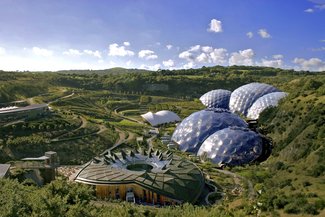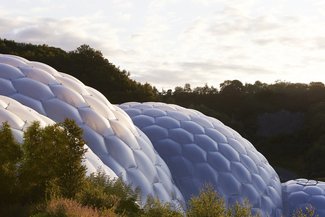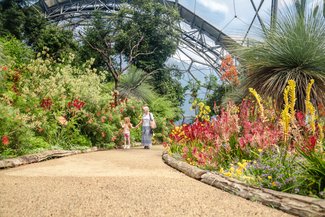The Eden Project in Cornwall is founded on the idea that humanity should leave the planet in a better state than we found it. It’s why our world-famous Biomes are built in a disused china clay quarry, healing an industrial scar on the beautiful Cornish landscape. But to be good stewards of Planet Earth into the future means putting education at the heart of our mission. Educating the next generation is the only way to steer society towards a greener future in which we live harmoniously with nature.
In 2018-2019, a generous grant from Edge helped fund Eden Project Learning’s Horticulture Advocates Programme, which inspired secondary students to explore STEAM careers in horticulture. Following the success of this programme, we developed a joint venture partnership with Cornwall College to develop several higher education initiatives. Alongside our partners, we now offer unique university-level programmes to equip students with the knowledge and skills they need to tackle environmental challenges, all with hands-on experience at Eden’s Biomes.

What’s on offer at Eden?
Together with our partners, we’ve developed a range of exciting courses. These attract a mix of those straight from A-levels (or equivalent), and those who value the small group learning and relaxed, nature-rich campus of the Eden Project to large city centre universities. Some of our students are career changers who want to move from an unfulfilling job into a purposeful one that will make a real difference, while others are career ‘boosters’ who want the green skills and knowledge to implement meaningful change in their existing profession. All of this means the average age of our students is about 30, so it’s a unique learning environment.

Our flagship programme is the Bachelor of Science in Horticulture, which includes two potential pathways: Plant Science or Garden and Landscape Design. We also offer a Master’s in Land and Ecological Restoration, which is all about healing our broken places – clearly an area leading to no shortage of work!
To cater to those already working in the sector, we also offer a two-year Level 7 Ecologist Apprenticeship. Apprentices are typically jobbing ecologists, usually from organisations like Natural England, the Environment Agency, the National Trust or a wildlife charity. If they successfully submit a dissertation at the end of their apprenticeship, they’re awarded the full Master’s in Land and Ecological Restoration. We currently have around 60 apprentices, and the programme is proving extremely popular with those climbing the career ladder in their organisation.
The ethos at the heart of our courses
All our courses focus on practical, real-world, community-driven learning. Horticulture students must complete around 200 hours of work alongside our experts in the Eden Project gardens. Meanwhile, we encourage our Level 7 apprentices to curate their own learning, ensuring that their assignments are relevant to work they’re already doing.
On top of this, wherever we can, we invite students to work on community initiatives. For example, last year, four apprentices designed an Eden Project show garden (and won Gold) at the annual Cornwall Spring Flower Show. Another team of apprentices turned bus stops in the local area into bee-friendly ‘buzz’ stops. And every year, the Eden Project commits to employing at least six of our students on one-year contracts. These are just a few examples, but they highlight how we always try to find ways to involve our students in community initiatives.

Finally, while our courses are place-based and designed to provide students with hands-on experience, they also aim to raise the profile of horticultural professions more generally. To tackle the ecological crisis, it’s critical to highlight the importance of these roles and increase public awareness of the complex skills they entail. We want people to respect and value these vital professions.
New initiatives beyond higher education
Of course, the Eden Project isn’t just higher education-focused. We’re also embarking on other ventures. One such initiative is the Youth Environmental Service, funded by the Pears Foundation and others. Its ambitious goal is to provide every young person in the UK with a year’s paid work in environmental fields. We’re also establishing new Eden Project sites in Morecambe Bay and Dundee, each featuring its own local educational partnerships and curricula tailored to the local environment.
Already, Eden Project Morecambe is on track to receive £50 million from the Government's Levelling Up Fund. We’re now seeking match funding to transform a neglected area of the bay with new Biomes focused on nature’s rhythms, humanity’s impact on these, and how we can restore them. While construction hasn't started yet, the project has already inspired the Morecambe Bay Curriculum, a community-curated, sustainability-focused, place-based approach to learning, led by Lancaster University.

Back in Cornwall, Sky Primary and Eden Project Nursery opened at the Eden Project site in 2022. Here, we’re piloting a new nature-inspired curriculum. By immersing young learners in the wonders of the Eden Project, we hope to foster a deep connection with nature that they will carry for life. In short, a lot is happening.
Those of us who work here consider ourselves pragmatic optimists. We recognise that wishful thinking won’t solve global ecological issues. Change requires action. That is why we get our hands dirty – often literally! It’s thrilling to see how Eden Project’s educational engagement has evolved over the last decade. We’re playing just a small part in leaving the planet better than we found it. But we aren’t the only ones – support from organisations like Edge plays its part, too. Cumulatively, these small things lead to big changes. And once a movement gains momentum, there’s no stopping it. Our country has witnessed several industrial revolutions over the centuries. By now, it’s high time for a green one.
Dan Ryan is an environmentalist, educator, and Head of Higher Education at the Eden Project.

